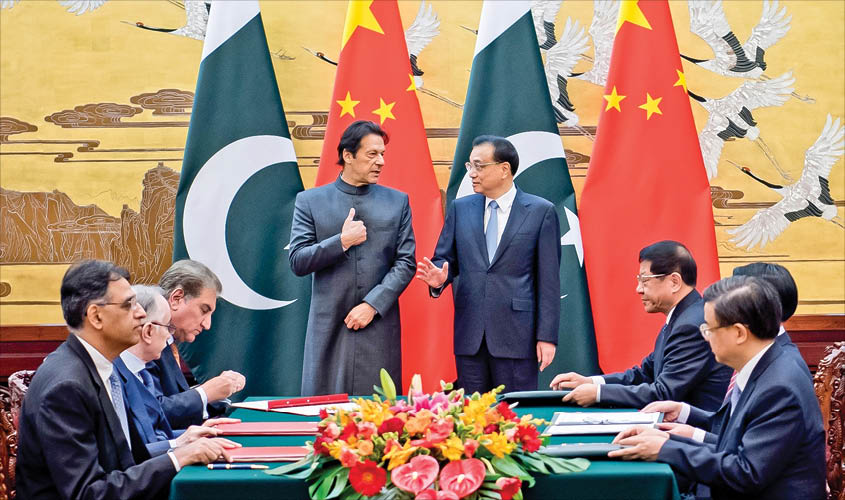This is the second of a two-part article on China, Pakistan, US and India. The first part of the article, ‘Is CPEC East India Company Mark 2?’ was published on 2 December.
As far as US-Pakistan relations go, 2018 certainly started with a bang. On 1 January, President Donald Trump’s itchy Twitter finger hit the keyboard with gusto, accusing the Islamic Republic of taking $33 billion of aid since 2002. In return, Trump claimed all the US had received were lies and deceit on the issue of counter-terrorism. It was not the New Year’s Day greeting Islamabad had wished for.
For seasoned Trump watchers though, it had an air of inevitability about it. If the American public is perhaps less versed in international relations and overseas political developments than others, Pakistan is a country known to them largely through one lens—terrorism. Osama Bin Laden was not discovered hiding in an obscure cave complex on the Pakistan-Afghanistan border, but instead in 2011 living in a compound in the garrison town of Abbottabad. The issue of terrorism was also a key component of Trump’s quest to win the Republican Presidential nomination. When Pakistani-American Syed Farook and his recently settled Pakistani bride, Tashfeen Malik opened fire at a health facility Christmas party in San Bernadino on 2 December 2015, Trump responded five days later by issuing his contentious call to ban all Muslims from entering the United States.
Following Trump’s election, relations cooled further between the two countries, even between elements such as the Pentagon and Pakistani military, who once enjoyed good relations. Whilst the occasional voice has been heard in Pakistan’s support (such as Michael Scheuer, the former head of the CIA’s Bin Laden unit), the man who wrote The Art of the Deal sees little worth bidding for in Islamabad.

Trump’s big picture centres on making America great again. As such, China appears as both the economic competitor, but also a future potential military rival. Here Trump is not acting as differently as some may think—Obama’s tentative foreign policy was in reality designed to pivot away from problematic commitments in the Middle East towards Asia and the Pacific, in order to counter the influence of China. The coming together of China and Pakistan on security issues at the United Nations is causing concern to both India and the US. China’s refusal to add Jaish-e-Muhammad founder Masood Azhar to the list of terrorists held by the Al-Qaida Sanctions Committee is a troubling act that will not have gone unnoticed in the White House.
If Pakistan proved to be too much bad news for the US, China has its own concerns. The need to keep separate Pakistan’s raucous Islamic clerics and campaigners from events in Muslim Xinjiang is an important policy. So far clerics have shown greater interest in upholding Pakistan’s notorious blasphemy laws than events over the border, but as the scale of China’s crackdown on the Uighurs garners greater attention, can this last? The last thing China wants is for its investments to become a target for protests or even more serious violence, in the name of Islamic solidarity. In 2017, the European Foundation for South Asian Studies expressed concern that Pakistan could distract some of its Islamists by re-focusing efforts on its proxy war in Jammu and Kashmir. As is clear from China’s attitude to Masood Azhar, this, and the mainstreaming of extremists like Hafiz Saeed, may be approaches with which China has few concerns.
The China Pakistan Economic Corridor (CPEC) has given impetus to regional and separatist actors in Pakistan, and from the country’s significant diaspora, who appear to look more critically at the programme than Islamabad does. Here uncomfortable questions, such as whether CPEC resembles an East India Company Mark Two, are being asked. The nature of China’s existing investments in Africa, and most notably Sri Lanka, is being discussed with doubts—and more—emerging about the vast amount of debt Pakistan is potentially taking on. Can a country which may be seeking support from the IMF take objective decisions about its ongoing relationship with Beijing? The answer to debt cannot always be more debt. The harsh lesson from Sri Lanka’s port development at Hambantota is that when countries cannot meet their financial obligations to Beijing, President Xi is happy to take territory in return. Having initially bought its port at Gwadar from Oman, Pakistan holds territory in an area jealously watched by Iran for any Saudi presence, and one where development greatly worries India. Gwadar forms the end of the long road from, or towards China. Pakistan cannot risk losing a deep water port it waited decades to develop, through getting into the same debt trap the Sri Lankans did.
At a European Foundation for South Asian Studies seminar at the European Union’s Parliament in Brussels on 7 November, representatives from the Baloch and Kashmiri diaspora reminded their audience that CPEC will also travel through disputed territory. The opportunity to air criticism of both Pakistan and China’s human rights record was taken, and the greater the global focus on CPEC, the further such opportunities will occur. Beijing and Islamabad will not like everything they are going to hear over the next few years. It is not just President Trump who is watching the Pakistan-China relationship closely.
Part 1: https://www.sundayguardianlive.com/opinion/cpec-east-india-company-mark-2
Dr Paul Stott is an academic working in the Centre for International Studies and Diplomacy at SOAS University of London, and is a fellow of the European Foundation for South Asian Studies. He tweets @MrPaulStott

